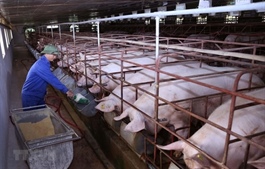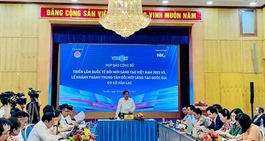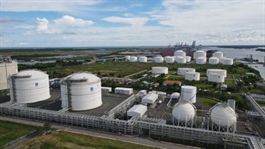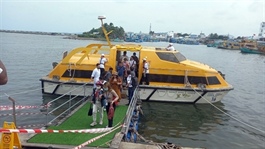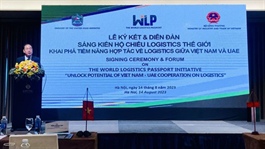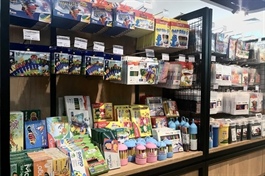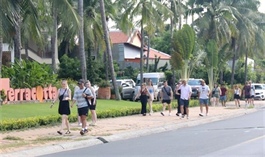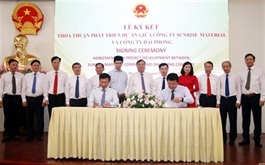From farm to table: bringing a taste of Việt Nam to the world
From farm to table: bringing a taste of Việt Nam to the world
The neatly arranged bunches of exotic-looking fresh longan immediately caught Yu Ohyama’s eyes while shopping at her local supermarket in Hiroo, a glitzy residential area in Tokyo, Japan.
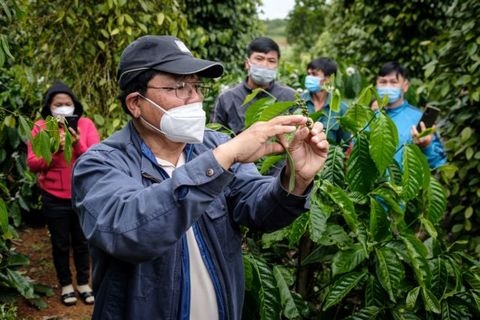
An agronomist guides farmers on signs of healthy peppercorns on a farm in Đắk Sông District, Đắk Nông Province. — Photo courtesy of IFC |
“Frozen and dried longans are common in Japan, but it was the first time I’d found fresh ones. I was pleasantly surprised. They came from Việt Nam, and they tasted great,” said Yu.
But what the 32-year-old financial professional didn’t know was the long and challenging journey the Vietnamese longan had taken to enter Japan.
Việt Nam has over 80,000 hectares of land producing about 600,000 tonnes of longan a year, but just 2 per cent is exported as fresh fruit. A thin coat and watery filling until recently made it challenging to maintain the fruit’s freshness after phytosanitary treatment, a process used to eradicate pests and diseases, before entering strict markets that demand good quality produce and have high standards in food safety and biosecurity.
Keys to unlock high-value markets
Việt Nam is one of the world’s largest producers and exporters of a wide range of agricultural products, including black pepper, coffee and rice. The Southeast Asian country is home to more than 30 different types of tropical fruit trees and industrial crops, and longan is just one with rich commercial potential.
Despite Việt Nam’s emergence as a global agricultural powerhouse, with annual exports hitting over US$53 billion in 2022, its products often remain locked out of high-value markets. Underlying this are the often uncertified and unsustainable farming practices that leave crops blighted by high levels of chemical residue, pests and diseases. A lack of traceable, certified and quality compliant supply chains adds to the issue. As a result, produce is exported mainly through informal channels at less competitive prices.
To address these challenges, IFC is helping to break new ground to realise the agricultural sector’s full potential as a driver of prosperity in rural communities.
Since 2020, IFC and Việt Nam’s Ministry of Agriculture and Rural Development have taken aim at longan and other fruits to update and enforce requirements governing their phytosanitary measures, traceability, and food safety standards, in line with international practices.
In a first for Việt Nam, an innovative and country-specific ‘cold treatment’ process was developed to eradicate any pests inside the fruit, while avoiding the use of chemicals or irradiation, to keep longan fresh and safe for export.
“This environment-friendly method is a game-changer as it helps Vietnamese fruits enter high-value Asian and European markets, which don’t accept our traditional methods,” said Nguyễn Thu Hương, Deputy Director of the Plant Protection Department, Ministry of Agriculture and Rural Development.
Pests are now killed during the fruit’s exposure to low temperatures over a prescribed amount of time. Moreover, cold treatment can be performed during transportation, which helps save time and costs for exporters.
IFC also supports awareness-raising on standardised farming processes, from field to factory, through an online training programme, primarily for dragon fruit, durian, longan and passion fruit. This aims to expand the growing area of products qualified for export and improve standards in post-harvest treatment and packing to ensure traceability throughout the supply chain, which is a prerequisite to enter high-value markets.
The work is already delivering fruitful results. With IFC’s support, before longan received the green light to end its six-year wait to reach Japan, Vietnamese red dragon fruit was approved to enter the South Korean market in July 2021 and passion fruit reached China a year later.
Similarly, Việt Nam’s pepper sector is also on a quest to unlock new markets.
The country is the world’s largest producer and exporter of black pepper, and its exports represented over half of the total global trade in black pepper. However, the industry faces several sustainability challenges.
In response, IFC joined McCormick, a US-based maker of seasonings, spices and condiments and a major buyer of pepper, in a three-year project to help realise the company’s goal to build a sustainable, certified, and quality-compliant pepper supply chain in Việt Nam by 2025.
This involved helping more than 2,000 farmers and key suppliers in central Đắk Nông Province, one of the pepper capitals of Việt Nam, increase the sustainability of their farm management practices. To guide farmers on properly using agrochemicals, 20 demonstration farms were established as innovation and knowledge transfer hubs. Vietpepper, an e-learning tool, helped maximize the project’s reach, especially during the COVID-19 pandemic lockdowns.
“I knew using too many agrochemicals would be harmful to the health of trees and soil, but I couldn’t do anything else, otherwise the pepper trees would die,” said Ngô Thị Xuyến, who started a pilot crop with 500 pepper poles with a project agronomist’s support. By partly replacing pesticides with biological remedies and only using good quality agrochemicals, this translated into a dramatic fall in agrochemical traces to meet buyers’ requirements.
Xuyến was not alone. Through working directly with farmers to address agrochemicals usage and adhere to international certification standards, more than 1,000 participating farms adopted recommended sustainable farming practices. Over 2,100 hectares were transformed into sustainably managed land, and the average yield jumped from 2.5 to 3.6 metric tonnes per hectare.
Seeds of change bears economic fruits
Việt Nam’s recent pivot to sustainable agriculture to unlock export markets is not only better for consumers’ health and the environment. It also makes financial sense.
For exporter Hoàng Phát Fruits, a company based in the southern province of Long An, the reward for meeting Japan’s entry requirements is fresh longan sold at about $13 per kilogramme, compared to $2/kg domestically. This price allows the company, which sent the first 10-tonne consignment in January, to buy longan grown in areas with identification codes at a price 30 per cent higher than the untraceable longan.
On just one of McCormick’s supply chains, 725 hectares of sustainably grown pepper with less chemicals, certified by McCormick’s Grown for Good standard, delivered a $3.6 million boost to the incomes of 347 farmers last year when compared to the previous pre-project crop, with each pepper pole earning farmers $5 more on average.
The drive to embrace crop sustainability was further financially incentivised by IFC’s Global Trade Supplier Finance facility, which provided suppliers of McCormick’s herbs and spices with financial incentives linked to improvements in measures of social and environmental sustainability. During the project, three local pepper suppliers gained between $6,000 and $28,000 through discount rates of working capital financing per sale, depending on their sustainability ranking. For participating farmers, they received nearly $500,000 in incremental revenue from the premium price for certified pepper.
“Sustainability is the way to unlock the full potential of Việt Nam’s horticulture sector,” Hương added. “This is a win for our sector, its farmers, and consumers internationally.”








